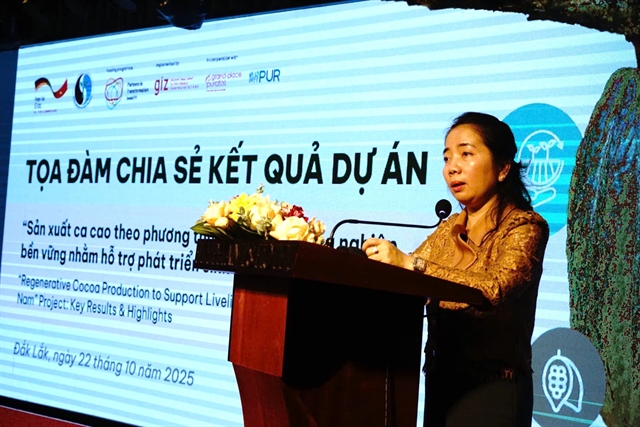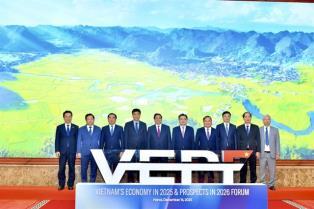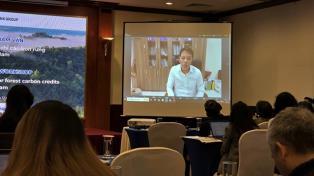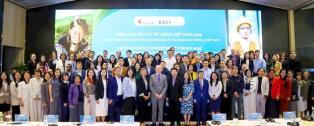Sustainable cocoa production helps Vietnamese farmers access carbon market
The Regenerative Cocoa Production to Support Livelihood Development in Việt Nam (ReCoPro) project is helping Vietnamese farmers boost production value while reducing greenhouse gas emissions - laying the foundation for them to access the carbon credit market in the near future.

BUÔN MA THUỘT — The Regenerative Cocoa Production to Support Livelihood Development in Việt Nam (ReCoPro) project is helping Vietnamese farmers boost production value while reducing greenhouse gas emissions - laying the foundation for them to access the carbon credit market in the near future.
A workshop to summarise the four-year project was held on October 22 in Buôn Ma Thuột City, co-organised by Puratos Grand-Place Vietnam (PGPV) and the Deutsche Gesellschaft für Internationale Zusammenarbeit (German Agency for International Cooperation-GIZ) the German Agency for International Cooperation (GIZ).
The event gathered more than 50 representatives from Government agencies, international organizations, cooperatives, and businesses to evaluate the project’s results, share lessons learned, and discuss future directions.
Speaking at the workshop, Đặng Thị Thủy, Deputy Director of the Department of Agriculture and Environment of Đắk Lắk Province, highlighted that agriculture accounts for over 69 per cent of the province’s economic structure, with more than 384,000 hectares of perennial crops - including 214,000 hectares of coffee, nearly 45,000 hectares of durian and 28,000 hectares of pepper.
Despite these advantages, Thủyy noted that Đắk Lắk’s agriculture faces serious challenges such as climate change, drought, high input costs, labour shortages, and limitation in value chain linkages.
Many cooperatives remain small scale and weak management, while most agricultural products are only preliminarily processed, yielding low added value.
In this context, cocoa cultivation has emerged as a promising new crop, supported by local farmers and authorities. The provincial authorities develop the ReCoPro project that promotes regenerative farming and agroforestry by encouraging farmers to intercrop cocoa with forest and fruit trees.
Previously, many farmers cleared forest trees to plant fruit crops, but through ReCoPro’s training and demonstration models, they have become more aware of the ecological and economic benefits of maintaining forest cover.
Over nearly four years, the project distributed 90,000 seedlings to 300 households in Đắk Lắk and Lâm Đồng provinces, accompanied by technical support and regular field monitoring.
A total of 88 training sessions and demonstrations were held with over 2,000 farmer participants, helping them adopt practices such as composting, biological pest control, and water-efficient irrigation.
As results, pilot farms in Ea Kar reported a 1.5-fold increase in cocoa yield between 2023 and 2025 after applying regenerative farming techniques.

According to Thủy, the province aims to cultivate about 1,300 hectares of cocoa by 2030, producing roughly 1,400 tonnes annually, concentrated in Ea Kar, Buôn Đôn, Ea H’leo, Krông Ana and Ea Súp.
Beyond farming techniques, ReCoPro has strengthened local cocoa cooperatives through training in marketing, e-commerce, packaging, and branding.
Farmers have learned to promote products on digital platforms, improving their market access and income stability.
A pioneering aspect of the project is the pilot community carbon finance mechanism, which pays farmers VNĐ3,000–4,000 per living tree to encourage carbon-sequestering practices.
This initiative serves as an early model for larger-scale carbon credit systems aligned with Vietnam’s planned national carbon market in 2028.
Daniel Herrmann, Head of Climate Policy at GIZ Vietnam, emphasized that the project demonstrates how adaptive, climate-friendly cocoa farming can simultaneously increase productivity, improve livelihoods, and contribute to Vietnam’s climate action goals.
Justin Jacquat, Cocoa Manager for Asia-Pacific at Puratos Grand-Place, added that their goal is to build a cocoa value chain that is not only efficient in productivity but also regenerative, inclusive, and sustainable. They are enhancing traceability and laying the groundwork for a deforestation-free cocoa industry, in line with EU regulations.
Co-financed by the German Government and PGPV and implemented by GIZ from November 2021 to November 2025, ReCoPro aims to increase smallholder cocoa farmers’ incomes while fostering a sustainable agricultural transformation.
The project’s success demonstrates that regenerative agriculture and inclusive business models can create a resilient, competitive, and climate-smart cocoa sector in Việt Nam - one that connects economic progress with environmental stewardship and global sustainability goals. — VNS





